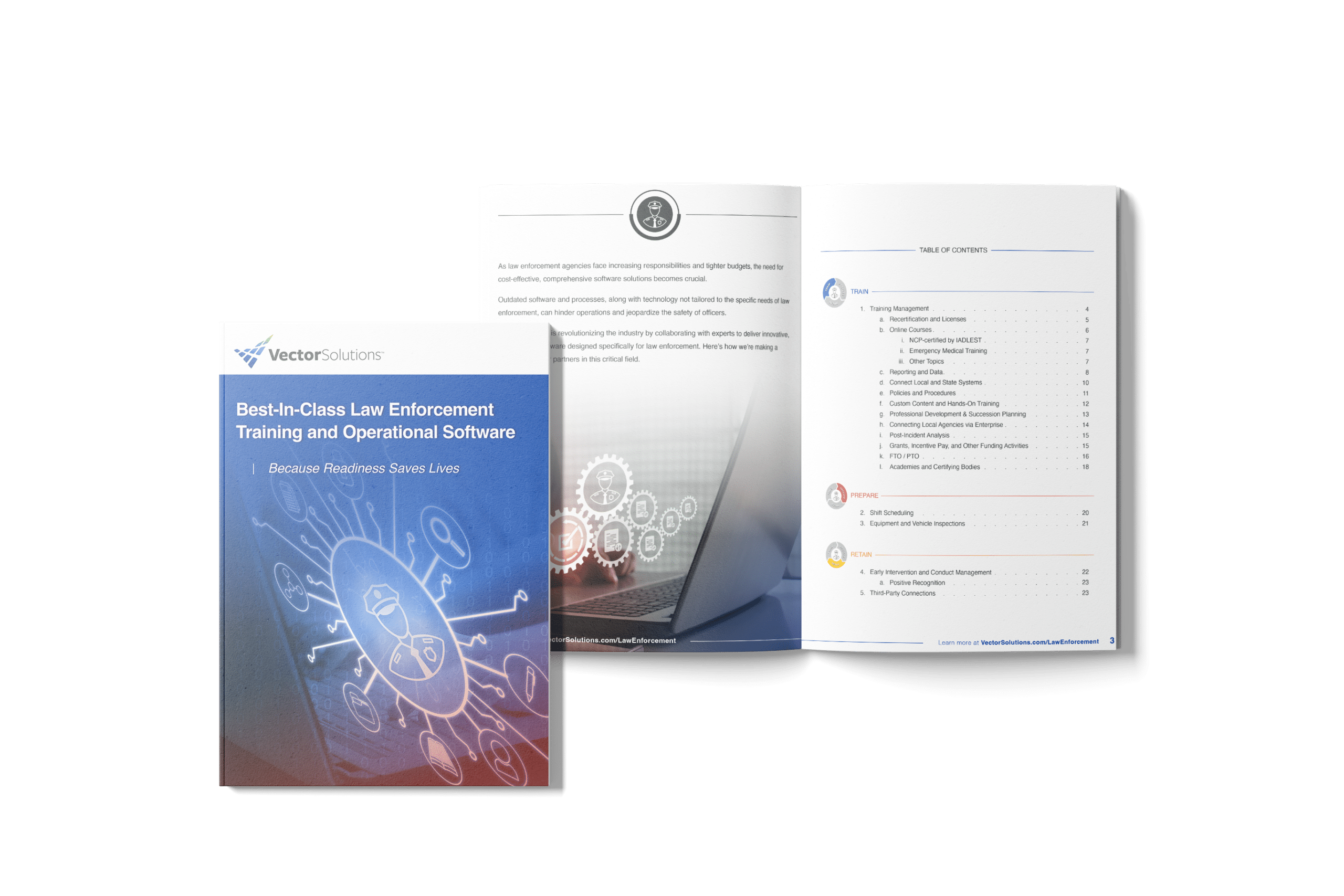November 1, 2024 6 min read

IACP 2024 Highlights: Change is here. Are you ready?
Industry:
Solution:

As an event that brings together more than 16,000 public safety professionals, it can be difficult to distill the experience of attending the International Association of Chiefs of Police (IACP) Conference down into a single overarching theme. However, whether it was the numerous jampacked educational workshops focused on artificial intelligence (AI), the sight of attendees lining up to test VR headsets, or the mechanical whirs of robots being shown off in the exposition hall, it was clear that law enforcement leaders attending IACP 2024 all had a similar priority: Preparing for the future.
According to the IACP, the conference is, “the largest and most important law enforcement event of the year.” This year’s event was held in Boston and, like every year, featured more than 200 educational workshops and 600 exhibitors.
Among those exhibitors were over 200 software companies alone, with product offerings ranging from computer aided dispatch and evidence management to AI-powered investigative insights. This focus on digital tools underscores the rapid evolution of policing over the last several years and the need for technology solutions that support keeping up with this rate of change.
The Rapidly Evolving Policing Landscape
Beyond the use of technology to save time and streamline internal processes, agencies also need to be able to keep up with the new and evolving strategies utilized by criminals, many of whom are perpetrating or planning their activities online.
In a conversation about topics of current interest to the FBI during the General Assembly on Oct. 21st, FBI Director Christopher Wray highlighted the threat of cyberattacks from foreign actors and the challenges posed by encryption technology wielded by technology and social media companies. According to Wray, more companies are moving toward warrant-proof encryption, which could result in these companies sharing fewer tips regarding illegal activities taking place through their platforms.
“Do we want businesses to unilaterally be able to make decisions that impede the ability of law enforcement to do their jobs?” he said, adding that his request would be that companies maintain their own access to the data and preserve an avenue for law enforcement to obtain legal access.
During this discussion, Director Wray also spoke about the importance of partnerships between local, state, and federal law enforcement, saying that by fostering these relationships, agencies can “make everyone’s resources go further.”
Partnerships were also the focus of the following day’s discussion during Tuesday’s General Assembly. More specifically, the modern relationship between law enforcement and the media. John Miller, Chief Law Enforcement and Intelligence Analyst for CNN, and Jeffrey Pegues, Chief National Affairs and Justice Correspondent at CBS News, discussed how today’s law enforcement agencies can partner with trusted members of the media to tell the stories law enforcement want told.
“You have to build that relationship with the media,” said Pegues, adding that the recently updated IACP Law Enforcement Code of Ethics, originally adopted in 1957 and updated in 2024, underscores that law enforcement is acknowledging the changing times.
Miller agreed, saying that, through social media and the ease of sharing photos and videos, today’s agencies can tell their stories in a way that could never have been done in years past.
“We’re in a period of unique, unprecedented opportunity,” he said. “It’s a time for rebranding.”
Using Technology to Tell Your Story
The power of telling these stories and utilizing social media was best highlighted during two educational workshops at the conference, “Your Process is the Problem: How to Fix an Outdated Recruiting System,” and “Futureproof: Strategies for Implementing New Technology for Public Safety.”
In the former, members of the Vancouver (WA) Police Department shared how, through the use of updated branding, a new website, dedicated social media accounts, and key software solutions, the department decreased the number of open sworn positions from 14% to less than 1% and increased the number of applicants by 114%.
In the latter, two agencies, Chula Vista (CA) Police Department and Sacramento (CA) Police Department, discussed how to communicate effectively about the implementation of new technologies and the impact these technologies have had at their departments.
During the workshop, Chula Vista PD Chief Roxana Kennedy shared two videos the agency produced to showcase the technologies utilized by department. In one, a reenactment demonstrates the use of unmanned aerial vehicles (UAVS), more commonly known as drones, to gather facts and reach positive outcomes. In another, real body worn camera footage shows how drones and other technology helps officers save lives, including rescuing a man from a burning vehicle.
According to Chief Kennedy, by creating these videos, the agency has been able to tell stories that even anti-police activists can’t argue with.
“Technology is the future of law enforcement,” she said, adding that in her opinion, drones are the greatest de-escalation tool agencies have.
Sacramento PD Captain Clay Buchanan also shared how his department has incorporated VR into the department’s training program, as well as a more recent effort to utilize AI technology for report writing. In addition to saving time, the agency hopes that the AI report writing tool will boost officer morale, he said.
While the primary function of implementing VR is to enhance training for officers, the technology has also paid off in other ways for Sacramento PD. Describing the VR headsets as “a valuable tool,” Captain Buchanan shared how inviting members of the public to take part in VR demonstrations has helped turn their detractors into advocates.
How Else Can Technology Benefit Law Enforcement Agencies?
Training is one of the major themes of the IACP conference, and as such, there were plenty of discussions around training, both in the workshops and on the exposition hall floor. Beyond the educational opportunities available at the conference, agency leadership were afforded the opportunity to meet with vendors and get up close and personal with software designed to support law enforcement training programs and other critical elements of operational readiness.
But with hundreds of companies all looking to garner interest from attendees, how were police leaders able to find the solutions that best fit their agency’s needs? Here’s a few tips from the experts:
- When reviewing vendors that offer online training for law enforcement, look for courses that are already approved by your state’s POST or certifying authority. Additionally, look for courses that are certified by a nationally recognized organization, like the 50+ Vector courses certified as part of IADLEST’s NCP program.
- Find out whether the vendor has extensive experience working with law enforcement agencies and what other agencies work with them. For instance, is your state’s POST or certifying authority already partnering with the vendor, like the relationship Vector Solutions has with 21 POSTs across the country?
- Don’t be afraid to ask about price. It’s important to determine early on whether the solution offered by the vendor meets your financial goals. Typically, software-as-a-service companies, like Vector Solutions, price software based on agency size, meaning that the software is accessible, no matter how big or small your department is.
- Ask what else the vendor offers. For example, do they offer a training management system and does it have an integrated FTO mobile app? (Hint: Vector does!)
Learn More About New and Emerging Law Enforcement Technologies
From online training to virtual reality, agencies have many new technologies to choose from, but how can they be sure that these new tools are actually beneficial to their officers?
Vector Solutions, in partnership with industry experts, recently examined this question in a series of webinars offering insights into the use of technology and blended training strategies in a law enforcement setting.
Effectively Design Online Training Programs for Law Enforcement
Watch On-Demand
Vector Solutions’ suite of industry-leading software solutions for law enforcement includes training management systems, online training courses, FTO/PTO/CTO/live skill evaluations, academy automation, and an early intervention and conduct management system.










